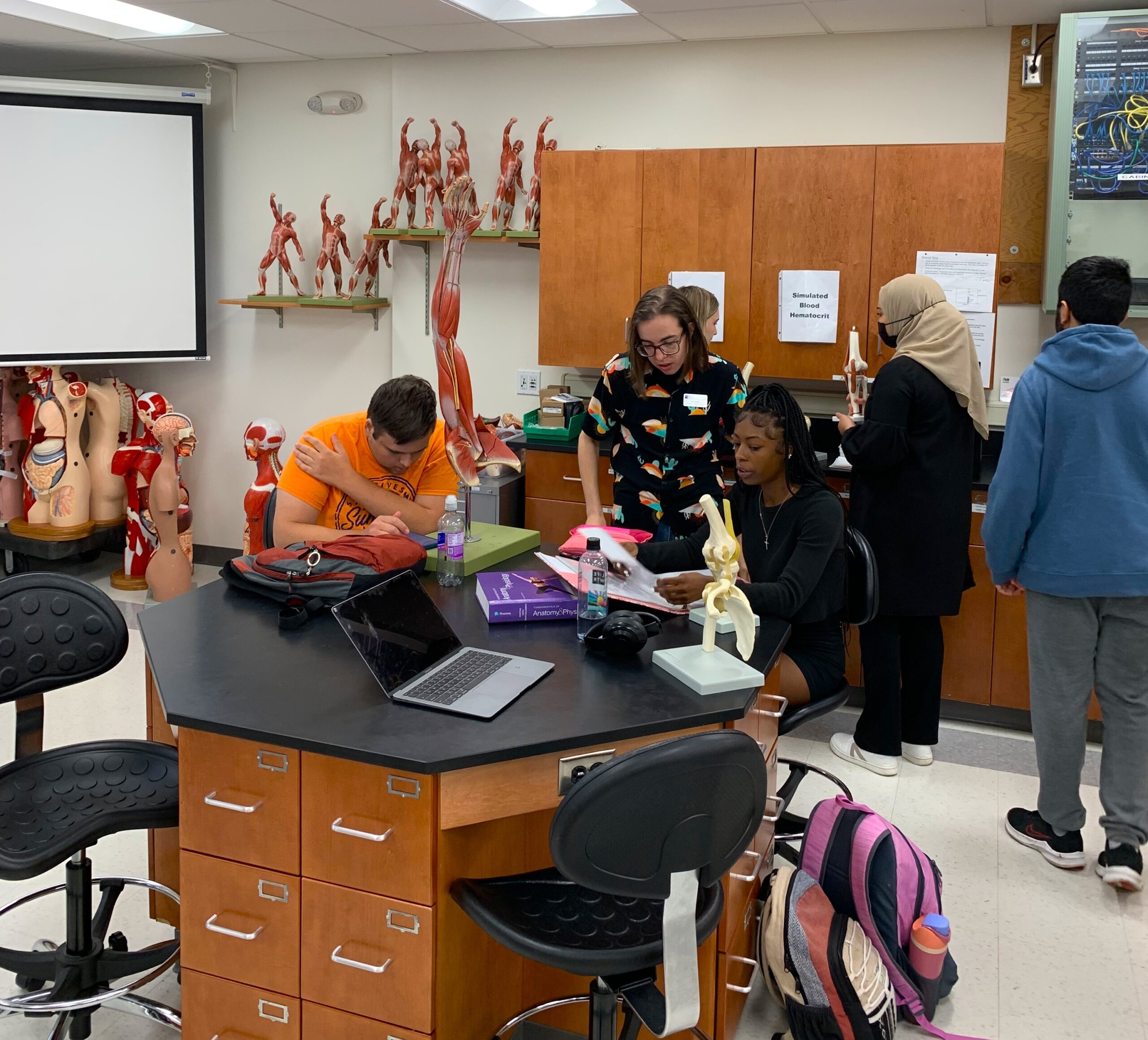Faculty express concerns with leadership, Chancellor responds
By: Kavahn Mansouri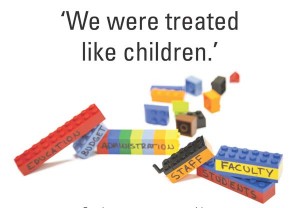
Editor-in-Chief
Contribution by Joe Makoto
It was a day off for students and a day of professional development “hell” for some STLCC employees that lead to the Thursday, Oct. 18 Board of Trustees meeting in which STLCC Chancellor Myrtle Dorsey was confronted by several faculty members.
Florissant Valley professor Carol Berger, Ph.D. was one of the several faculty members to speak at the Board of Trustees meeting. Berger said in her 31 years of teaching with STLCC she had never attended a professional development day that was as big of a failure.
“I’ve been to every staff development day and I have to say; they haven’t always been winners, but I’ve always come away with something,” Berger said. “I’m sorry. I think maybe the road to hell is paved with good intentions and there were a lot of people who were present Tuesday who would have said we were, in fact, in hell.”
The faculty expressed concerns regarding Tuesday, Oct. 16, when all STLCC campuses were closed and students were free to enjoy a day off while employees attended the annual professional development day at the Forest Park campus. Twelve hundred to 1,400 faculty and staff were seated in Forest Park’s un-air-conditioned gymnasium on the 80-degree day for eight hours, according to STLCC-Meramec Assistant Professor Lisa Mizes, who spoke at the Board of Trustees meeting. Mizes, along with eight other STLCC employees spoke at the meeting describing their frustration with the development day and the chancellor’s management of the college.
‘Climate of Fear at all Levels’
The last item on the agenda before the faculty members addressed the board was the Chancellor’s Report, in which Dorsey went over a few items and shared some words on the professional development day.
“I took that day to focus on communications. That was the intent; to tell people what we were doing, how we were doing and actually have some experts there to talk about those things,” Dorsey said. “It’s my understanding that it wasn’t quite taken that way. I understand where there is some confusion. The intent was not to be disrespectful to anyone; the intent was not to make anyone feel badly about having to take leave or whatever.”
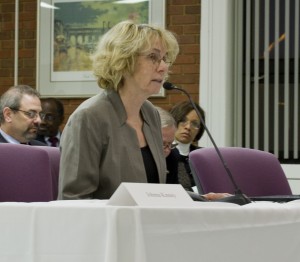
National Education Association (NEA) Junior College Division vice president and STLCC-Florissant Valley Professor Cindy Campbell was the first to speak for the faculty members at the BOT meeting. Campbell recalled being “talked down to” by an unnamed member of the administration at the development day for speaking out on the importance of faculty.
“I will not apologize or alter my feelings or thoughts related to the importance of faculty,” Campbell said. “We are not a corporation and should not act as such. We the faculty are the foundational block of STLCC, and faculty in general are the foundational block of any academic institution.”
Meramec Professor Kay Blalock, Ph.D., walked past the table where speakers addressing the board were asked to sit when her name was called, she turned her back to the board and faced her colleagues and stated she would not turn her back on them.
“Perhaps it is time for the board to acknowledge that low morale and a climate of fear at all levels, across the district, can seriously affect the mission of the college, the success of our students and the image as an institution of higher learning of which STLCC is known,” Blalock said. “The disorganized event, the disgruntlement of those in attendance, the lack of productivity and the disrespect shown by the chancellor to the STLCC employees are dismal manifestations of the corporate direction that we’re headed in.”
Blalock added that no one was enriched at the meeting and that faculty was talked down to.
“We were treated like children,” Blalock said.
‘Relentless Micromanagement’
One by one, faculty members approached the white table; gave testimony to their concerns for the college, pleaded with the board for change and offered support to their colleagues; all of which was frequently interrupted by waves of applause from the meeting’s audience.
Deaf Communications professor Mary Leubke said the professional development event was representative of a “much larger problem.”
“It was perceived as the worst staff development day we’ve ever had,” Luebke said. “This event is representative of a much larger problem. The board is not in touch with anyone other than the chancellor, everything is top down management, everything is a secret and we’ll find out after the fact on all things.”
Leubke added that she felt the college was at a standstill with “relentless micromanagement.”
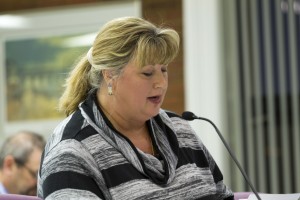
“There is either no reason to go to your dean, vice president or president because their hands are tied or they’re as much in the dark as we are,” Leubke said. “Nothing gets done and things don’t get approved so we can’t move forward because of relentless micromanagement.”
The rain of criticism did not stop at the professional development day. Meramec professor Margaret Hvatum spoke on STLCC’s budget cutting affecting classes and student’s ability to learn. Hvatum said faculty members were willing to work in low-enrollment format classes and for less pay, but were denied.
“When faculty are willing to work for less you should take us up on our offer,” Hvatum said.
Leubke said respect for STLCC employees is little to none and that the college is running in a “climate of fear.”
“Perceptions are leading to a culture of fear. I just spent a year fighting and beating breast cancer; so I am now afraid of very little,” Leubke said. “There is no respect for any segment of the employment population, especially faculty. In fact, there is downright distaste for faculty.”
STLCC-Wildwood Chair of Sciences and Physical Education Afzal Lodhi, Ph.D., also spoke about a climate of fear affecting the college.
“There were several people who called today and yesterday to tell me personally that they would very much like to come here, but they are afraid,” Lodhi said. “This is what we have done by having the chancellor we have now.”
Meramec Mathematics Professor Lillian Seese said the she learned more about the chancellor than professional development during the event.
“I wanted to let you know what I learned at Tuesday’s Professional Development activity. The first thing is the chancellor’s understanding of professional development is much different from mine. The second is that the chancellor appears to have an incredibly low level of respect for the employees of the college,” Seese said. “No professional development took place.”
Seese added the event served as a reminder of the “disconnect” between the chancellor and the employees of STLCC.
Meramec Chair of History and Political Science department Steve Collins, Ph.D., encouraged the board to stop being “led” and added that his students learned “nothing” on Oct. 16.
“I encourage the board to not be led, but to lead,” Collins said. “Do not believe that the University of Texas Community College Leadership Program is a meccah for all great ideas. As a historian and a historian of technology, I know not all ideas are good.”
‘Room for Improvement’
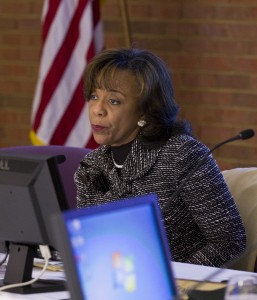
After the speakers were through, Board of Trustee member Hattie Jackson responded to speakers by stating STLCC can only grow from the professional development day experience and that she was disappointed employees were not “energized” by the event.
“I believe you learn from your experiences,” Jackson said. “I hope we can have a conversation about expectation and how we can have a world class professional development program that embraces continuous learning for student success. I believe we can do that. I believe the chancellor’s own reflection we heard tonight, and we heard a lot of your reflection and I’m disappointed that you were not energized and it wasn’t a learning day.”
Jackson added the college has next year and hopes the college can come together to energize each other and focus on student success. Board of Trustees Chair Libby Fitzgerald then called the meeting adjourned and the room emptied.
Campbell said she was excited about the attendance and the content of the meeting and added she is hopeful the board is open to change in the future.
“I am very excited as the vice president of the faculty union that we had such a great turnout and had so many quality faculty members speak on what they were feeling and there perception of how the professional day went,” Campbell said. “I am very hopeful that the board listened and heard what we had to say so that things can be changed for the future. Our time needs to be valuable.”
Meramec President George Wasson said he felt the board and the chancellor were open to the faculties’ suggestions.
“It sounds to me as if the faculty feels that there is a lot of room for improvement and it sounded like the board and the chancellor were open to those suggestions,” Wasson said. “We’ll look for more ways to improve.”
Dorsey said although the Board of Trustees meeting was negative, she does not believe the event was received in a unanimously negative way.
“I don’t think you can say it’s unanimously [negative]. I would not say it was unanimous,” Dorsey said. “It’s just like what we had at the forum; it was just a misunderstanding and people had answers, not the correct answers, to some questions.”
The important thing for STLCC is to evaluate what went wrong and do better next year, Dorsey said.
“Throughout everything that I do, I always tell people that it’s important that you do it, evaluate it and you try to make it better next time,” Dorsey said. “I had one person come up to me and say ‘thank you for treating us so professionally.’ One faculty member made a suggestion to me about something we could do so we’re going to talk about that at the leadership meeting.”
Dorsey said STLCC is in a period of a change and that she understands change can be difficult for employees.
“Change is difficult, it’s very difficult and it makes people uncomfortable. I think that this was different for them,” Dorsey said. “And again I don’t have a point of reference as to what it was [like].”
Dorsey said that there would be evaluations sent through email to those who attended the event to gain more feedback of the event.
“I don’t quite understand all of it, but again as I was telling them; I said it in the morning and I said it when we were about to leave that you’ll get an evaluation and we’ll take your comments into consideration,” Dorsey said. “And again, I repeat, this is my first go around with this so I’m definitely going to look at that and see how we can make it better.”
The NEA will be holding an off-campus meeting for faculty members to “vent” and come up with a “game plan” based on the results of the Board of Trustees meeting Campbell said.
“We have not gotten any feedback,” Campbell said. “We the NEA are hosting a meeting off campus for all of our faculty, members and non-members alike. Just so faculty members can decompress, we can talk about the state of where we think things are, what we thought of the meeting the other night, any directives or any kind of things we want to happen next and come up with a game plan for the faculty as a whole.”
Dorsey added that she has high hopes that she and the college can learn from this experience.
“I always, no matter what I do, I always say we can do things better the next time,” Dorsey said.
Campbell said Tuesday was a “tipping point” for faculty and that she hopes the board and the chancellor take what the faculty said into consideration.
“The faculty as a whole expressed their concerns and frustrations of how things are going and the tipping point was the Tuesday staff day,” Campbell said. “We obviously would hope there is communications and that we are listened to and that our thoughts and our feelings are taken into consideration by all of college administration.”










